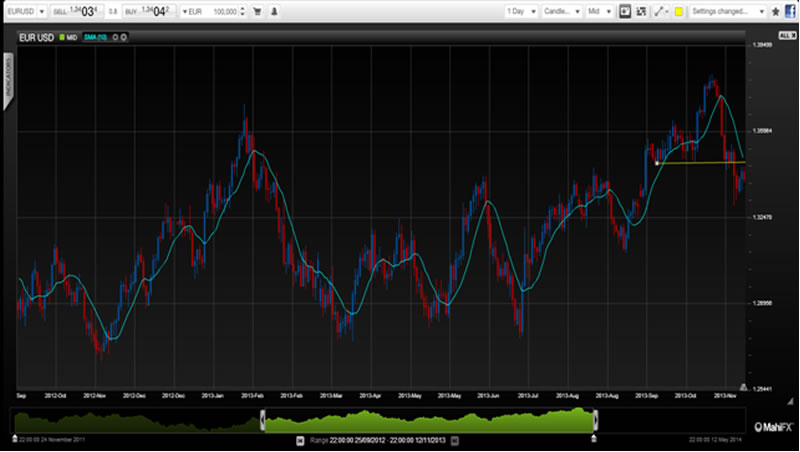Currency Wars Redux – is USD next?
Currencies / Forex Trading Nov 15, 2013 - 05:04 PM GMTBy: Submissions
 Who wants a strong currency? If that question was for an opinion poll of finance ministers and central bankers the response would be a firm no. But in reality no poll is needed. The last couple of weeks’ action has spoken louder than words.
Who wants a strong currency? If that question was for an opinion poll of finance ministers and central bankers the response would be a firm no. But in reality no poll is needed. The last couple of weeks’ action has spoken louder than words.
Forex traders were once again reminded that when a currency makes strong gains the chances of verbal or monetary intervention are probably not far off. Losses on long positions can swiftly follow. Those long USD should be cautious.
Talk of currency wars has made the headlines regularly since the outbreak of the financial crisis in late 2007. A lack of economic growth prompts countries to try and grab a slice of someone else's demand. The quickest way to do that is to devalue the national currency giving goods and services of that country a short-term competitive advantage.
The yield advantage made AUD and NZD attractive to investors engaged in carry trades – that's borrowing in a low interest rate currency to buy a higher interest rate one. However, policy makers in those two countries decided recently that enough is enough.
Last week, the European Central Banks cut interest rates ostensibly to avoid deflation. But many observers interpreted it as a move to also weaken the EUR. It worked. On the same day of the ECB announcement the Czech Central Bank intervened sending the CZK plummeting.
A currency war victory for the ECB

How strong a USD is the Fed prepared to stomach?
With EUR/USD down, GBP/USD stalled and the USD/JPY weakening that leaves USD as a potential stand-out among the majors. Since late October USD has moved from around 79 to just over 81 against a basket of currencies – a fairly sharp move. Though USD is still sitting below a high of 84.58 reached in September.
The question is will the US Federal Reserve allow USD to make continuing substantial gains against other major currencies? After all the US economy, though not quite firing on all cylinders, is still doing better than most European counterparts. And Japan has yet to prove it can sustain its recent growth.
But the answer is that the Fed probably does not want a strong USD. That will certainly be one dilemma it faces if it ever manages to taper its quantitative easing programme. Another often overlooked factor is that US debt is substantially held by foreigners. This gives the US authorities a strong motive to devalue – a form of default by stealth.
If USD does start making sustained gains – particularly sharp ones – dollar bulls should be cautious.
By Justin Pugsley, Markets Analyst MahiFX
Follow MahiFX on twitter at: https://twitter.com/MahiFX
Disclaimer: This material is considered a public relations communication for general information purposes and does not contain, and should not be construed as containing, investment advice or an investment recommendation, or an offer of or solicitation for any transactions in financial instruments. MahiFX makes no representation and assumes no liability as to the accuracy or completeness of the information provided.
The use of MahiFX’s services must be based on your own research and advice, and no reliance should be placed on any information provided or comment made by any director, officer or employee of MahiFX. Any opinions expressed may be personal to the author, and may not reflect the opinions of MahiFX, and are subject to change without notice.
About MahiFX
MahiFX is headed by David Cooney, former global co-head of currency options and e-FX trading at Barclays Capital and responsible for the award winning e-commerce platform BARX and Susan Cooney, former head of e-FX Institutional Sales in Europe for Barclays Capital. Operating as a market maker, MahiFX provides traders direct access to institutional level execution speeds and spreads through its proprietary-built fully automated pricing and risk management technology, lowering the cost of retail forex trading.
MahiFX global operations are headquartered in Christchurch, New Zealand with offices in London, UK with development and support teams in both locations for 24 hour service. The company is regulated by The Australian Securities and Investments Commission (ASIC), Australia’s corporate, markets and financial services regulator.
© 2005-2022 http://www.MarketOracle.co.uk - The Market Oracle is a FREE Daily Financial Markets Analysis & Forecasting online publication.



